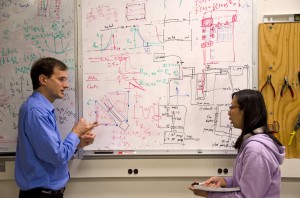Article by Agnella Izzo Matic
“It’s naïve to think science could be a neutral topic.” That is the headline promoting ETOPiA’s most recent theater production, “The How and The Why,” which examines conflicting theories about female evolutionary biology from the perspectives of a female professor and a female graduate student. Dr. Matthew Grayson founded ETOPiA (Engineering Transdiciplinary Outreach Project in the Arts) at Northwestern University in 2008 and has produced, and sometimes starred in, the autumn productions. For Grayson, the ETOPiA plays serve to start a conversation about the purpose and relevance of science in our lives. Previous plays have delved into the life of Marie Curie, human cloning, and the atomic bomb during WW II.
When he is not on stage, Dr. Matthew Grayson can be found in his role as Associate Professor of Electrical Engineering and Computer Science at Northwestern University. After receiving his PhD from

Princeton University, he followed with a post-doctoral fellowship at the Technical University of Munich. Dr. Grayson has been awarded a CAREER fellowship from the NSF and is also a Humboldt fellow.
Currently, his research group studies the electronic properties of materials and engineers them to have a novel function. One major area that they focus on is thermoelectrics, where waste heat can be converted into electricity or, alternatively, electricity can generate a temperature differential (refrigerate or heat). For instance, rub your hands together. Grayson plans to turn that small amount of heat generated in your hands into a kilovolt (that’s 1,000 Volts) of electricity using his thermoelectrical materials. Among other things, this might be useful to generate low-intensity X-rays, which need very large voltages to accelerate the electrons but don’t require a lot of current.
To see this research in action is to better understand it. The semiconductor-based electronics being tested are so fine that they need to be viewed under a microscope for the proper connections to be soldered. For testing, these electronics are placed in a super-cooled magnet, which has been mounted in the floor of one lab and extends downward into Grayson’s second laboratory one floor below. From the top, the magnet appears like a Medusa of wires, hoses, and connections protruding in all directions.
It is not often that you encounter individuals who combine such unique interests: theater and electrical engineering. Dr. Grayson credits his involvement in theater with a positive influence on his teaching, both in the classroom and in seminars. He has received two teaching awards while at Northwestern University and warm reception for his conference lectures. Students are at ease talking with him during office hours and he keeps an encouraging eye out for talented young minds.
To him, one of the most important roles he fills as a mentor is making sure that people, especially female students, are aware of opportunities that they might have otherwise missed. For instance, Grayson and his lab members invite middle and high school girls from the Chicago area into their lab every spring as part of the Society of Women Engineer’s Career Day for Girls. His first two PhD students were women and he has mentored 3 other female undergraduate students in the last 2 years. In addition, he perceives the ETOPiA plays as an unconventional experience that can ignite an interest in science for a younger generation that comes from multiple perspectives, ethnicities, and genders.
As with most other academic researchers, Dr. Grayson sees challenges ahead in publishing the next manuscript, getting the next grant, and graduating the next student. However, he views these as part of the reason he chose this profession, because he enjoys taking on those challenges. Grayson says, “In the end, you have to know your field and you have to know yourself. When you think something is interesting, you have to be confident enough that, when no one else even understands why you’re doing that, you “That’s ok, I’m sure it will become clear eventually”.”
***************
Dr. Grayson was nominated for the 2012 AWIS-Chicago Motivator Award by Ms. Sunanda Prabhu-Gaunkar, a PhD candidate in Grayson’s laboratory.
